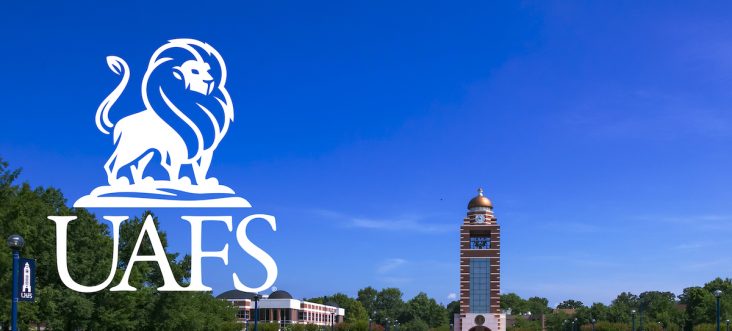UAFS officials dealing with revenue losses, budget restrictions
by April 27, 2023 12:20 pm 1,172 views

Editor’s note: This is the first of three stories about budgeting and finances at the University of Arkansas at Fort Smith.
With the country no longer in a pandemic and business returning to normal, University of Arkansas System schools are returning to pre-pandemic budgeting. Part of that shift includes planned tuition increases and a hiring freeze at the University of Arkansas at Fort Smith.
Because Dr. Terisa Riley began her tenure as chancellor of the University of Arkansas at Fort Smith after the budget process in 2019 and only went through the budgeting process during a pandemic, new post-pandemic guidelines from the University of Arkansas System are leading to some tough decisions.
Each year, the UA System sends a list of guidelines to schools in the system as they budget for the coming fiscal year. Budgets must be submitted by the end of April and are reviewed by the Board of Trustees at its May meeting. This year, the UAFS budget for fiscal year 2024 (July 1 to June 30, 2024) is due April 28, and the meeting date when budget’s are reviewed is May 25.
In 2020, the only guideline given to schools was they could not raise tuition and revenue should cover expenses. In 2021 and 2022, schools were told they could use reserve funds – a schools savings account – to make a balanced budget.
“The board fully understood that our institutions might need to use reserve funding. We were in a very precarious situation for higher education across the system, state and nation with losses in enrollment during the pandemic,” Riley said. “They wanted to make certain we were able to operate without making critical decisions about areas that might rebound after the pandemic.”

When new budget guidelines were issued March 29, changes were made. First, the UA System limited institutions from raising tuition and fees by more than the Higher Education Price Index of 5.2%. As an exception, UAFS may be allowed to increase tuition and fees in percentages greater than 5.2% if the university’s Board of Visitors supports the increase.
TUITION CHANGE
Riley made the decision in 2021 to not raise tuition and fees for students to help families during the pandemic. Last year, tuition was increased slightly. However, because the UAFS Promise Program guarantees fixed tuition rates for students who remained enrolled and on track to degree completion, the university did not see great gains in tuition revenue. The program has held a tuition rate for FY20, FY21, and FY22 of $171 per credit hour for in-state undergraduates. For students enrolled in the Promise Program in FY23, the per credit hour rate is $175.
Even though the Promise program will not be offered to students entering UAFS for the first time this fall or for those no longer eligible for the program, university budget council members, made up of faculty, staff and students, suggested a 7.49% increase in tuition and fees. If the budget is approved by the Board of Trustees, new, in-state, undergraduate students and students no longer enrolled in the UAFS Promise Program beginning in the fall will be charged $188 per semester credit hour.
“We have carefully assessed this proposed increase in consideration of a federal increase to Pell Grant maximum awards, meaning that our Pell-eligible students should not see large increases to their out-of-pocket costs to attend UAFS in FY24,” Riley said in an April 14 email to staff.
Approximately 22% of UAFS’ revenue comes from tuition and fees. The remaining revenue comes from the following sources:
• State appropriation, which is $25 million this fiscal year;
• Scholarship funding and other funding for students, of which UAFS serves as a passthrough of funds as it makes its way to students;
• Federal and state grants;
• Additional funds for operational expenses from the University of Arkansas at Fort Smith Foundation; and
• Revenue earned from things like the Center for Economic Development, concurrent education programs, the Western Arkansas Technical Center (WATC) and other revenue streams.
BUDGET CHANGES
The UA System also said this year schools in the system cannot use reserve balances to balance budgets except for payments to one-time initiatives such as deferred or critical facilities maintenance and lump sum payments. UAFS’ submitted budgets the last two years have used reserve funds to balance the budget, Riley said.
“When we submitted our budgets, last year and this fiscal year that ends June 30, we thought we might have to use reserve funds. Last year, not only did we not have to use reserve funds, but we were able to put a little more than $1 million in the bank. For this year, we do not anticipate having to use any reserve funds for this fiscal year,” Riley said. “The instructions now are that we can only use (reserve funds) for a one-time cost. They are asking us to balance our budget. That’s reasonable.”
But that means some things that are often taken for granted will not happen. For one, no employees will be promised a pay increase this year.
“That’s hard,” Riley said.
In addition to the loss of the loss of approximately 10% of its annual operating budget when Sebastian County voters did not vote to renew a sales tax which provided more than $6 million for university operations, UAFS is facing the discontinuation of federal pandemic support for higher education that provided millions of dollars of relief through CARES Act, HEERF, and ARPA funds, and a reduction in state funding as a result of decreases in enrollment and credential production.
“We anticipated not having the (federal funding), so we spent quite a bit of money received as most universities did on technology, security and upgrading HVAC. We were very careful to not be so reliant on it that it didn’t cut us to the quick when we didn’t have it any more,” Riley said. “We fully believe we made good decisions with these funds.”
REVENUE LOSS RESPONSES
In order to counter losses to revenue, UAFS is making tough choices, Riley said. There is a hiring freeze for vacant positions with exceptions for positions that are absolutely critical to teaching and campus safety or are paid by grant funds.
“We will review each open position individually, including faculty vacancies, to determine which ones will continue to be filled. We will honor offers that have already been made to candidates who have accepted positions, even if they have not yet started employment. Vacant positions will be removed from the salary and benefits budget for FY24 and only restored if funds become available,” Riley said in the staff email.
There will be departmental budget reviews to determine where budgets can be trimmed. The university is reviewing projected interest on cash to determine if reinvestment could gain additional income for the university. And there will be a review of all non-critical programs and activities to determine which ones can be removed for at least one year.
UAFS tightening its belt might lead to concern among the university community and the Fort Smith community at large, and Riley said such concern is understandable.
“Should people be concerned? If people are not always concerned about finances, I don’t understand them. I am always concerned about the money because it is not mine. It’s someone else. The state has entrusted me with appropriated money to run this organization. Tuition and fee money is entrusted to us by families who have chosen to invest here,” Riley said.
FINANCIAL STRENGTH
That said, the university is on solid footing and should be able to stay there for some time. Because the university has made fairly conservative decisions over the last several years, it has a healthy reserve balance.
“Our financial situation is really quite good. I know that seems in conflict with what you read in the email,” Riley said. “You save in order to have lots of money in the bank in case there is a problem in the future. There are always problems that happen, so you might as well as be prepared for them. That’s where we are now. We have put aside money every year to make sure we have a very healthy savings account.”
Since those reserves should be used for one-time things, it is also important to have plenty of funds that have been saved and are readily available to pay for operational expenses. UAFS does, Riley said.
“That is quantified by days you can pay for expenses without bringing in more money. We have 270 days of funds on hand available to us. So I wouldn’t have to bring in a penny of revenue for 3/4 of a year and could still be fully operational. To be clear, that is not typical at all. It’s hard to achieve that organizationally. But through very conservative management of our funds over many years, we have reached this,” Riley said.
The university also has a healthy balance in foundation funds. Though much of that is restricted funding, it is still a good source of support for the institution in the event there are any major concerns or financial problems, she said.
“Bottom line is, we have quite a bit of one-time money we can use for different initiatives,” Riley said. “I’m always concerned that we are doing the right thing financially. We have been in operation for 95 years. And I believe we are good to be in operation for another 95. But it’s decisions we make today that make sure that happens.”
